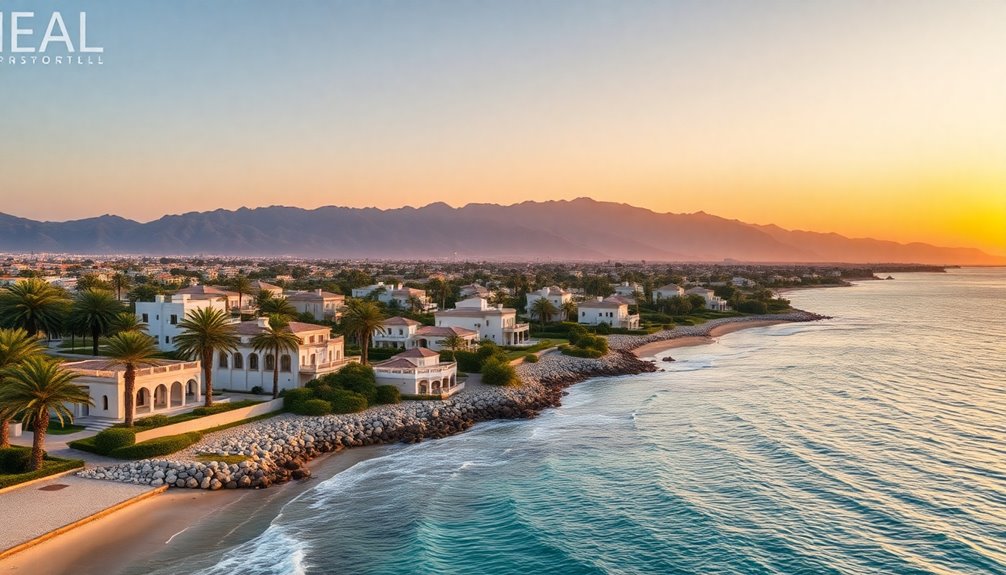If you're considering Greek property investment, you're in for exciting opportunities. The market is thriving, fueled by robust tourism and economic growth. You can find charming island homes in popular locales like Mykonos and Santorini, known for strong rental yields. On the mainland, areas like the Athenian Riviera and Piraeus offer promising prospects too. With anticipated construction and a favorable Golden Visa program, your investment can lead to significant returns. Plus, sustainable building trends are on the rise. Curious about specific locations and property types? There's so much more to explore about what Greece has to offer!
Key Takeaways
- The Greek property market is projected to grow by 10% in 2025, with strong demand for both island and mainland properties.
- Prime island destinations like Mykonos and Santorini are known for high rental yields, attracting significant investment.
- Emerging areas, such as the Athenian Riviera and Piraeus, offer lucrative opportunities for vacation rentals and second homes.
- The Golden Visa program allows foreign investors to secure EU residency with a minimum investment of €250,000 in real estate.
- Sustainable and eco-friendly developments are gaining traction, appealing to environmentally conscious investors in both urban and coastal regions.
Current Market Landscape

The Greek property market is on the rise, fueled by a combination of economic stability and increasing demand. With the European Union forecasting a GDP growth of 2.3% in 2025, this creates a favorable backdrop for real estate expansion.
Despite global uncertainties, the market has shown remarkable resilience, making Greece an attractive investment destination. Economic recovery and political stability have encouraged both domestic and foreign investments, while recent logistic investments across various regions contribute to market growth.
You'll notice a significant demand-supply gap; the annual demand for new homes stands at 35,000 units, but supply for 2023 and 2025 is only 30,000 units. This imbalance, particularly in urban areas and tourist hotspots, drives property values higher. Additionally, the anticipated €45 billion investment in Greek property by 2030, with a focus on new home construction, is expected to further stimulate demand.
Rising construction costs add further pressure on prices, reflecting the competitive nature of the market.
Athens and Crete are leading the charge, with notable price increases in urban centers and gentrifying neighborhoods. Popular vacation spots like Mykonos and Santorini remain high in demand for second homes and short-term rentals.
Major infrastructure projects are enhancing connectivity, further boosting interest in newly developed areas.
Investment Trends and Projections

As Greece's property market continues to thrive, a remarkable investment inflow is projected, with forecasts estimating €45 billion by 2030. This includes €40 billion earmarked for new home construction and €5 billion for upgrades, aimed at addressing the housing deficit and enhancing existing properties.
You can expect around 350,000 new homes to hit the market, driven by the demand-supply gap and economic recovery. The Greek real estate market is projected to grow by 10% in 2025, reflecting ongoing demand-supply dynamics and investor confidence.
Price projections indicate a 7% increase from 2023 to 2025, followed by a steady 3% annual growth from 2025 to 2030. This growth reflects the ongoing demand-supply gap, rising construction costs, and the fact that current prices remain 14% lower than their 2008 peak.
Geographic diversification is also key, as regional price variations offer unique opportunities. Supportive economic and political factors, including a projected 2.3% GDP growth for 2025 and the Golden Visa program, are likely to attract foreign investors.
Additionally, you'll see a shift towards more sustainable and technologically integrated properties, with a growing demand for green real estate and infrastructure projects enhancing connectivity across Greece.
High-Return Property Types

High-return property types in Greece present lucrative opportunities for investors looking to capitalize on the thriving real estate market.
Residential properties in tourist hotspots can yield up to 10% annually, particularly appealing during the five-month tourist season. Urban apartments in central Athens provide a respectable rental yield of around 4.49%, making them attractive for long-term investment. The Greek economy's strong growth, with projections indicating continued growth of 2.2% in 2025, is further enhancing property demand.
Commercial properties also shine, especially in areas like Mykonos and Santorini, catering to a booming tourism sector. With tax incentives and lower transaction costs, entering this market becomes even more appealing. The growing demand from international businesses adds to the potential for high returns.
Luxury and holiday homes on the Greek islands, such as Mykonos and Santorini, command significant rental returns due to their popularity. Prices for luxury villas range from €500,000 to €11,000,000, but the rental income can be substantial.
Crete offers similar opportunities with luxury sea-view villas starting at €350,000, which blend modern amenities with traditional charm.
With various high-return property types available, now is the perfect time to explore investment options in Greece's vibrant real estate landscape.
Ideal Investment Locations

When you're considering Greek property investment, pinpointing the ideal locations is essential.
You'll find prime island destinations like Mykonos and Santorini appealing for their strong rental markets, while urban hotspots like Athens and Thessaloniki offer vibrant economies and high demand. Additionally, the rising demand for Greek properties among foreign investors makes these locations even more attractive.
Don't overlook coastal investment opportunities along the Athenian Riviera and Halkidiki, where stunning views and growth potential await.
Prime Island Destinations
Investing in prime island destinations like Mykonos, Santorini, Crete, and Corfu can offer lucrative opportunities for those looking to capitalize on the thriving Greek property market.
Mykonos stands out with its high demand for short-term rentals, especially from May to October. Investors can enjoy sky-high rental yields, with property prices averaging €7,447 per square meter. Additionally, the island's property prices have been influenced by the robust growth of the real estate market in Greece.
Santorini, known for luxury, presents high-end real estate options that cater to discerning buyers, fueled by a robust tourism sector and ongoing market growth.
Crete offers diverse investment opportunities, from urban centers to charming coastal villages. Its booming tourism industry and natural beauty make it attractive for both vacation homes and eco-friendly projects.
Finally, Corfu's timeless charm and stability provide a well-rounded investment landscape. With relatively affordable property options compared to other islands, Corfu appeals to a broader range of investors.
The island's stable market conditions guarantee consistent investment value, while infrastructure improvements enhance property appeal. Each of these destinations promises unique advantages, making them compelling choices for your next property investment in Greece.
Urban Hotspots Explored
As you explore the opportunities in the Greek property market, urban hotspots like Athens and Thessaloniki stand out as ideal investment locations.
Athens uniquely blends historic charm with modern living, attracting both local and international investors. With year-round tourism, you'll find stable rental income potential, especially in revitalized neighborhoods like Plaka and Koukaki. The rise in residential property prices, up 9.35% in early 2025, signals strong market growth. Additionally, the city offers easy access to public transportation systems, making it convenient for residents and tourists alike.
Thessaloniki, known for its rich cultural heritage and vibrant nightlife, boasts one of Greece's most active real estate markets. Here, urban development projects like the Thessaloniki Waterfront are driving growth and creating investment opportunities. The resurgence of the economy fuels demand for well-located properties, ensuring significant returns.
Emerging areas in Athens, such as the Athenian Riviera and Piraeus, offer luxury developments and modern buildings that attract international buyers.
With infrastructure improvements enhancing quality of life, suburbs like Alimos and Glyfada are also seeing rising demand for residential properties. These urban hotspots position you well to capitalize on Greece's evolving property landscape.
Coastal Investment Opportunities
Greece's coastal investment opportunities offer a unique blend of stunning landscapes and lucrative returns, making them ideal for property buyers. If you're considering where to invest, Mykonos and Santorini stand out with rental yields often exceeding 10%. These islands attract a high volume of tourists, and the demand for quality accommodations keeps property prices climbing.
Crete also offers diverse options, catering to various buyer preferences. On the mainland, the Halkidiki peninsula presents excellent resort real estate prospects, particularly in the ecologically pristine Sithonia peninsula. Properties here are desirable for their natural beauty and investment potential, especially projects like Kriaritsi that provide land with building permits. This area is known for its stable income from rental properties, making it an attractive choice for investors.
Coastal areas with "Blue Flags" for cleanliness and safety are particularly sought after, ensuring long-term value. Don't overlook regions like Kineta, known for luxury properties with breathtaking views and modern amenities. The combination of high tourist demand and limited supply is driving prices up, making now a great time to invest.
With the Greek government's supportive policies for foreign investors, you'll find it easier to secure your ideal coastal property.
Overview of the Golden Visa

The allure of the Golden Visa program draws many non-EU/EEA nationals seeking a foothold in Europe. To qualify, you need a clean criminal record and must meet specific investment thresholds. The program allows you to include family members, such as your spouse and children under 21, and importantly, there's no minimum stay requirement in Greece.
You have several investment options starting with a real estate purchase. For properties requiring specialized conversions or restorations, the minimum investment is €250,000. If you're looking at rural areas, that threshold rises to €400,000, while high-demand locations like Athens, Thessaloniki, Mykonos, and Santorini require an investment of €800,000. Additionally, the program generated €2.6 billion in foreign investment in 2022, highlighting its popularity.
Keep in mind, you can't use a mortgage to finance the property for this visa.
The application process involves selecting a property, obtaining a Greek Non-Resident Tax number, and opening a Greek bank account. You'll also need to submit biometric data and various documents, including health insurance and a criminal record certificate.
The benefits include EU residency, visa-free travel within the Schengen Area, and eligibility for renewal every five years, ultimately paving the way for potential Greek citizenship after seven years.
Economic Factors Driving Growth

What drives the growth of the Greek property market? Several economic factors play an essential role. First, Greece's improving GDP growth, projected at 2.2% in 2025 and 2.3% in 2025, signals a recovering economy. Lower unemployment rates boost consumer confidence, fueling demand for both residential and commercial properties. This economic recovery, alongside macro-economic stability, underpins the market's resurgence.
Foreign investment also greatly impacts growth. With relatively low property prices compared to other European destinations, Greece attracts international buyers seeking high returns on investment, especially in tourist hotspots. The diverse property offerings, from serene island resorts to bustling urban developments, cater to various investor preferences. Additionally, the influx of foreign investment is significantly aided by the Golden Visa program, which allows non-EU citizens to obtain residency through real estate investments.
Additionally, infrastructure investments driven by e-commerce growth create a demand for quality logistics properties, further enticing investors.
Tourism acts as a powerful catalyst, with over 33 million visitors in 2023 increasing the demand for short-term rental properties. Platforms like Airbnb enable lucrative opportunities, with rental yields exceeding 10% in prime locations like Mykonos and Santorini.
Urbanization and infrastructure improvements, particularly in Athens and Thessaloniki, enhance urban living conditions, making property investments even more attractive.
Regulatory Environment and Incentives

A robust property market thrives not only on economic factors but also on a supportive regulatory environment that fosters investment. In Greece, the legal framework is firmly rooted in civil law, influenced by national laws and EU regulations. The Greek Civil Code outlines property ownership guidelines, while the Bank of Greece safeguards market stability. Additionally, understanding the intricacies of Greek Property Law is crucial for non-resident buyers to ensure compliance and avoid potential pitfalls.
When considering property investment, keep these key points in mind:
- Property Regulations: Transparency and fairness are prioritized, covering registration, land use, and zoning restrictions.
- Tax Incentives: Enjoy reduced property transfer taxes around 3% and favorable capital gains tax rates for long-term holdings.
- Residency Programs: The Golden Visa program allows non-EU investors to obtain residency by purchasing property worth over €250,000.
- Non-Resident Compliance: If you're a non-resident buyer, you'll need to navigate specific building regulations, which include restrictions on property types and sizes.
This environment not only promotes safe investments but also provides attractive incentives, making Greece a compelling option for property investment.
Understanding these regulations and incentives is essential to your success in the Greek property market.
Future Outlook for Investors

As Greece's property market continues to evolve, investors can expect a promising outlook driven by strong demand and significant economic recovery. Property prices are set to maintain their upward trajectory, fueled by increased investment inflows and the consistent rise in average property values. From $244,800 in 2017, values are projected to climb even higher, with transaction volumes reaching approximately $7.94 billion by the end of 2025. Moreover, foreign investment is surging, thanks in part to the Golden Visa program. This initiative allows non-EU citizens to secure residency by investing €250,000, attracting buyers from China and Europe, drawn by Greece's relatively low property prices and high return potential. Additionally, major infrastructure projects are enhancing connectivity, driving demand particularly in urban areas like Athens and Thessaloniki. As logistics and tourism sectors expand, the market is diversifying, opening doors for investments in smart, green buildings and hospitality properties. Notably, the residential sector is expected to dominate total market value, further solidifying its importance for investors looking to capitalize on growth. With significant sectoral growth and an upbeat economic environment, now's an excellent time to seize opportunities in Greece's thriving property market.
Frequently Asked Questions
What Are the Property Management Options for Foreign Investors in Greece?
When you're looking at property management options in Greece, consider thorough services that handle everything from initial assessments to ongoing maintenance.
Companies like Mobestate offer renovated and furnished properties, making your investment process smoother. You can also explore AEEAPs for lower risk and better tenant leases.
Remember to keep tax and legal requirements in mind, like obtaining a tax identification number and registering your property promptly. This guarantees a seamless investment experience.
How Does the Property Buying Process Work for Non-Residents?
Did you know that non-residents can secure up to 70% financing for property purchases in Greece?
To buy property, you'll first need a Tax Registry Number (AFM) and a valid passport. You'll submit an application specifying your reason for the AFM. Next, you will also need to meet the residency requirements in order to be eligible to purchase property. This typically involves spending a certain amount of time in the country each year or obtaining a residency permit. Once you have met these requirements and obtained the necessary documents, you can begin the process of finding and purchasing your desired property.
Once you have that, you can open a Greek bank account. After securing financing, hire a local notary to oversee the transaction and finalize the sale with the necessary documents.
Are There Language Barriers When Investing in Greek Real Estate?
Yes, there are significant language barriers when investing in Greek real estate.
Most legal documents, including contracts and title deeds, are in Greek, making them difficult to understand without help.
You'll need to communicate with local authorities and navigate complex bureaucratic processes, which require Greek proficiency.
Hiring a bilingual lawyer is essential for translating and clarifying these documents, ensuring you're compliant with local laws and regulations throughout the investment process.
What Are the Maintenance Costs Associated With Greek Properties?
When it comes to maintenance costs, you'll want to keep your ear to the ground.
Maintenance expenses vary widely. You'll pay around €10 to €300 monthly for common area upkeep, depending on where you live.
Individual utilities like electricity and water will add to your annual costs, averaging over €600 for a small apartment.
Plus, insurance isn't mandatory but necessary if you've got a mortgage.
Legal advice can help clarify everything.
How Can Investors Finance Their Property Purchases in Greece?
When you're looking to finance your property purchase, you've got several options.
Traditional bank loans offer competitive interest rates but require substantial down payments and lengthy approval processes.
If you need quicker access to funds, consider non-bank financial institutions that have less stringent requirements.
You might also explore international lenders for cross-border financing or alternative options like crowdfunding.
Government incentives can provide additional benefits, making your investment journey smoother and more affordable.
Conclusion
Investing in Greek property offers you a chance to embrace stunning island homes, explore thriving mainland opportunities, and access potential high returns. With favorable regulations, attractive incentives, and a booming market, you're stepping into a landscape ripe for growth. By seizing the moment, considering key locations, and understanding the Golden Visa, you're positioning yourself for success. Immerse yourself in this vibrant market, capitalize on emerging trends, and watch your investment flourish in the sun-kissed heart of Greece.









